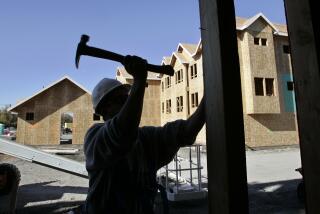Rights Group Finds Mortgage Lending Bias
- Share via
Latino and African American families in California are obtaining fewer conventional home loans in spite of the state’s economic rebound, a community rights group asserted Tuesday.
The problem “is not due to redlining or discrimination” by lenders, but rather is a standardized credit-history-scoring system used in the industry that inhibits banks and thrifts from making more home loans to minorities, said the Greenlining Institute in San Francisco.
The scoring--which takes into account credit cards, auto loans and other debt history--is too rigid and flawed because of “its focus on the white-suburban model of good credit customers,” which fails to accurately portray how well minorities can keep up with their home mortgage payments, the group said.
Many minorities “don’t meet those standards” in the scoring system “but they’re just as good credit risks” for home loans as are whites, said Robert Gnaizda, the group’s general counsel.
The Greenlining Institute called for a one-year moratorium on using the credit-scoring system while the industry devises an alternative to boost minority ownership.
Using Federal Reserve Board data, the Greenlining Institute said the number of African American families in California obtaining conventional home loans in 1996 totaled 6,517, down 15% from 1994.
The number for Latinos dropped 20% to 25,506, whereas the number for white families rose 3.8% to 141,986. The number of Asian-American families getting new conventional mortgages was nearly unchanged at 28,118.
The two main providers of the credit-scoring systems are Fannie Mae (formerly called the Federal National Mortgage Assn.) and Freddie Mac (formerly Federal Home Loan Mortgage Corp.), and their formulas have been adopted as underwriting criteria by many lenders.
That’s because Freddie Mac and Fannie Mae--which were chartered by the government but are now stockholder-owned entities--purchase billions of dollars’ worth of home loans each year from the banks and thrifts that originally make the loans. Those purchases are crucial to the banks, because they get fresh cash to make additional loans to consumers.
But Gnaizda maintained that if minority borrowers fall short on the Freddie Mac and Fannie Mae credit-scoring systems, lenders are inhibited from making the loans for fear they won’t be able to sell the loans to this so-called secondary market.
Hence, the scoring “has inadvertently caused a subtle form of redlining,” his group said.
His complaint was echoed by Angelo R. Mozilo, chairman of one of the nation’s biggest home mortgage lenders, Countrywide Home Loans, a unit of Calabasas-based Countrywide Credit Industries Inc.
“I have serious concerns about all this,” Mozilo said. The scoring formulas “leave out the most important ingredient: an individual’s motivation and what sacrifices will be made by them” to ensure the loan payments are made, he said.
The credit-scoring formulas “do impact underwriters at Countrywide, as well as all over the country” and inhibit them from making more loans, Mozilo said.
Freddie Mac and Fannie Mae defended their systems, challenged the group’s findings and objected to a moratorium on using automated credit-scoring systems.
“We never use credit-scoring as a single tool and we don’t expect our lenders to use it as a single tool,” said Barry Zigas, an executive vice president at Fannie Mae. Lenders are encouraged to “look at all aspects of a person’s credit history, including extenuating circumstances.”
Moreover, “our data shows that we’ve had continued increases in our purchases of loans made to minorities in California,” he said.
Freddie Mac spokeswoman Sharon McHale said that “automated underwriting systems actually increase home ownership opportunities for minorities because they promote systemwide fairness and consistency, rather than the subjectivity you have with a human underwriter.”
Meanwhile, the Greenlining Institute’s report also shows that minorities (and whites) were aggressively taking advantage of loans guaranteed by the Federal Housing Administration, which often have less stringent financial requirements, such as lower down payments.
The number of Latino families getting FHA-backed mortgages surged 67% between 1994 and 1996, and the number of African American FHA loans in California jumped 32%.
Gnaizda said the FHA figures illustrate the strong demand for home ownership among minorities but added that the demand will never be satisfied until they receive a bigger number of conventional home loans.
More to Read
Inside the business of entertainment
The Wide Shot brings you news, analysis and insights on everything from streaming wars to production — and what it all means for the future.
You may occasionally receive promotional content from the Los Angeles Times.











